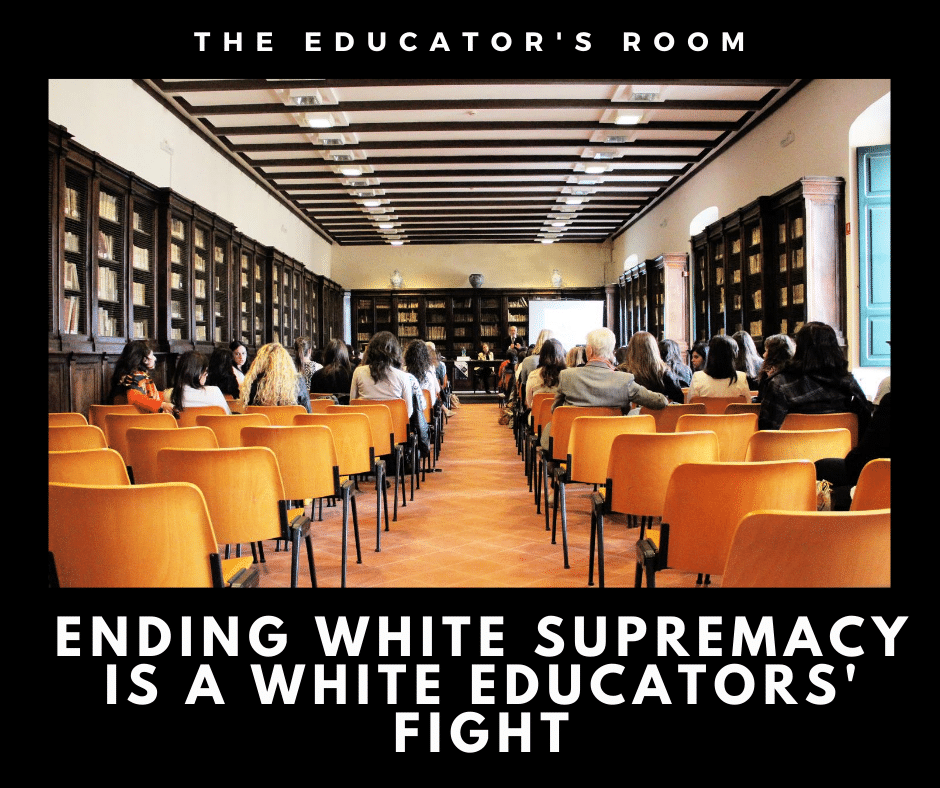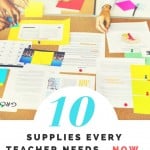Imagine walking into your classroom and seeing something completely different. Every child has been fed, is well-rested, and wearing clean clothes. Your classroom is stocked with all the materials you and your students need. As you move through your day there is plenty of time for art, music, science, and history. There is no standardized testing to distort your curriculum, nor lockdown drills to interrupt learning.
A better world is possible for teachers and the young people we serve. We can achieve it by eradicating white supremacy. To do this, we as white educators need to join this fight fully. And for that to be possible, we must understand our personal stake in the fight.
[bctt tweet=”To do this, we as white educators need to join this fight fully. And for that to be possible, we must understand our personal stake in the fight.” username=””]
White educators, it is time to figure out our personal stake in ending white supremacy. We can’t just join this fight as “allies” for students of color and educators of color. Ending white supremacy is in our interest as well. This is true whether we work with BIPCO educators and students or not.
What’s At Stake for White People
I remember when I was first asked what my personal stake was in ending white supremacy. The question caught me a little off-guard because I thought the answer was self-evident: Because it’s the right thing to do, and I want to do what’s right. But the questioner pushed me to dig deeper, and over time my thinking has definitely evolved. I realized with help that you cannot fully invest in a struggle that’s on the behalf of others.
I used to think of my relationship to white supremacy mainly through the lens of my relationship with Black people and other people of color. I wanted to end white supremacy because of the ways it harms loved ones, colleagues, and my students. At this time I recognized my white privilege. But it was difficult for me to conceive how white supremacy in fact also harmed me.
I was pushed by my partner, and through my work with the Center for Racial Justice in Education to figure this out. As a Jewish person of Eastern European descent, the loss of my ancestral language and culture via assimilation was one of the first things I thought about. I also thought about how white supremacy dehumanized me as a white person, but this remained more theoretical.
White Supremacy Corrodes Relationships
In recent years, the profound weight of this dehumanization has become more clear to me. Our humanity is rooted in our relationships with other people and living things. But white supremacy has a severely isolating effect on white people. Our relationships with other white people tend to be more shallow, and our relationships with Black people, Indigenous people, and other people of color are even more superficial if they exist at all.
It is incredibly hard for white people to forge deep relationships with Black people and other people of color, because there is a lack of trust. Many times I have found myself stuck in my own head, wondering if or how to say something. This anxiety and fear of messing up (and losing my imaginary “good white person card”) has caused me to be less present and authentic in my relationships with Black people, and so those relationships have suffered.
I remember this school year I had a conversation with a Black colleague about how coworkers saw me. She conceded that I could be, “a bit of white man sometimes.” I wasn’t surprised, but I was sad that nobody felt comfortable to tell me directly. I reflected that in my constant fear of saying or doing the wrong thing, I sent the message I was afraid of honest feedback or accountability. Honesty and accountability are key ingredients to real relationships. So by steeping in my fear of causing harm, I had actually cut myself off from my community.
What White Educators Gain By Ending White Supremacy
Because of the systemic nature of racism, we know that white supremacy is everywhere, including education. To fight against white supremacy in education, white educators to see our own stake in the fight to end white supremacy more clearly. We can’t just see our role as allies, because this perpetuates the white savior complex.
There is a lot we gain from winning this fight. Standardized testing, underfunding, gun violence, and so many of the most horrifying aspects of teaching today are outgrowths of white supremacy. In a world where Black lives matter, we will have the freedom to be the teachers we have always dreamed of being.
Even if these were are only victories, they would be more than enough (In the Jewish tradition we say dayenu). But white educators should know we have much to win at the spiritual level as well. By eliminating white supremacy, we will gain the ability to forge real, humane relationships with our students and our colleagues.
In addition to the damage to our interpersonal relationships, white supremacy damages our relationships with ourselves. White supremacy harms white people by first encoding our psyches with a false sense of superiority. Eventually, though, we are forced to reckon with this lie. For some white people, this means realizing they will never reach the pinnacle of the prosperity and power they were promised. They maintain racist thinking, and instead, they internalize the lack of wealth or power as a personal failure.
But if we’re lucky, we see white supremacy for what it is. At this point, we have to contend with the work of building an authentic sense of self-worth, separate from the internalized deception of white superiority. We are not innately smarter or better. After years of internalizing white supremacy, the work of finding genuine self-worth, of discovering the unique gifts you have to offer is not easy.
As I’ve learned more about white supremacy, I have struggled to rebuild a healthy, and real self-esteem. As a writer, a teacher, and across areas of my life, I’ve had to constantly ask myself, “Would this be possible if I wasn’t a white man?” It’s like we’ve been winning a thousand games of chess, and thinking of ourselves as experts. Now that we know the rules have been rigged in our favor all along, where do we go?
This is what I have come to see as my personal stake in ending white supremacy — the opportunity to live my life fully, authentically, and in a real relationship with all other people. I don’t want any more ill-gotten gains. I don’t want to walk around with a sick mind and a sick heart.
It is unlikely we will end white supremacy in our lifetimes. But we can move closer to a vision of a world where our communities and our schools are healthy. As white educators, we can start by saying, “Enough!” and demanding more for our students and ourselves.
Additional resources:
- What White Colleagues Need to Understand – Teaching Tolerance
- What’s at stake for white people in the struggle for racial justice? A conversation with Chris Crass pt. 4
- WHITE SUPREMACY CULTURE – Showing Up for Racial Justice (SURJ)
- A Word for White People in Two Parts – adrienne marie brown
- THE COST OF RACISM TO WHITE PEOPLE AND WHY THEY SHOULD CARE ABOUT RACIAL JUSTICE – Diane Goodman




